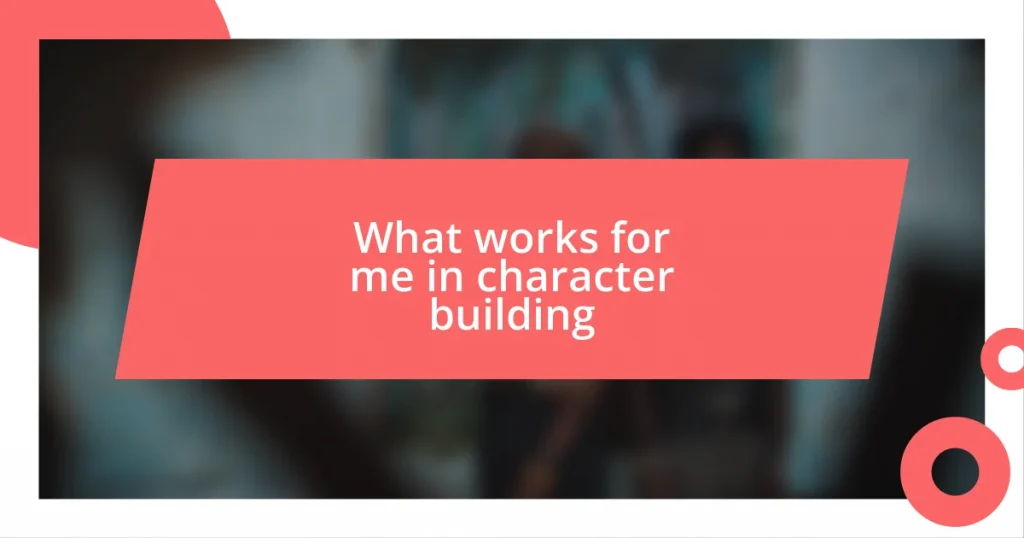Key takeaways:
- Character building is a personal journey shaped by reflection, experiences, and challenges that define one’s values and moral compass.
- Identifying personal values and setting specific, attainable goals enhances character development, fostering accountability and meaningful interactions.
- Celebrating progress, whether big or small, is crucial for maintaining motivation and reinforcing commitment to personal growth and resilience.
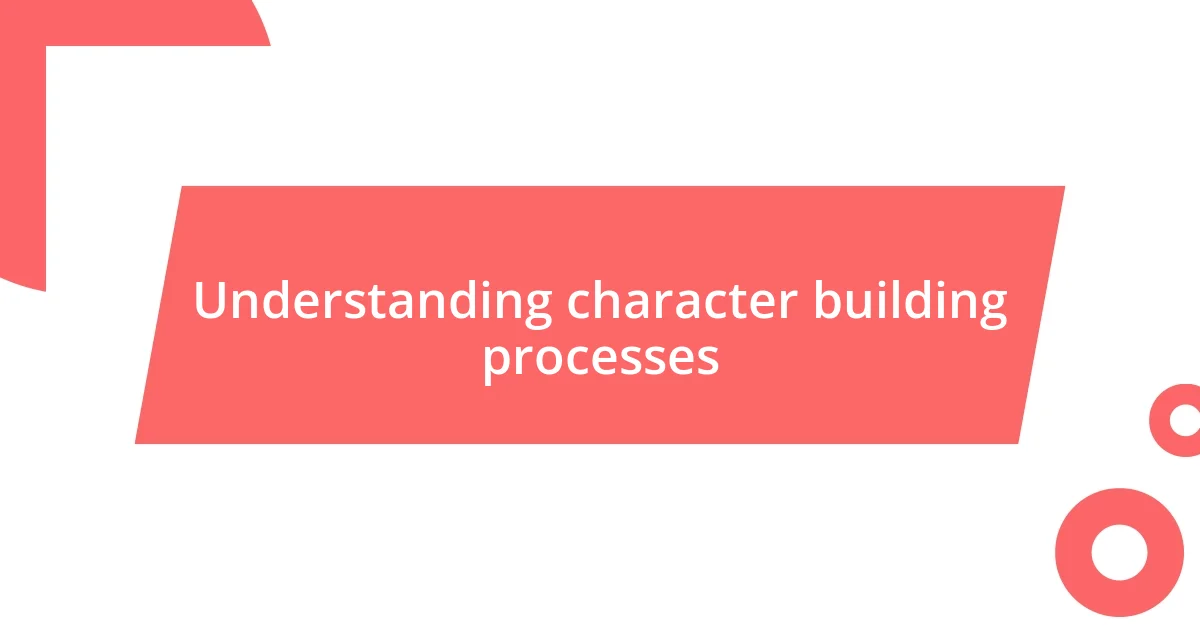
Understanding character building processes
Building character is a deeply personal journey, shaped by our experiences and choices. I often reflect on the times when I faced challenges that tested my values. How did those moments define me? It’s fascinating to see how adversity often becomes a catalyst for growth.
For me, the process of character building involves intentional reflection. I remember a time in my life when I had to make a difficult decision about loyalty versus honesty. In that moment, I realized that my values needed to be grounded in authenticity. Have you been in a similar position? It’s these pivotal moments that steer our moral compass.
Engaging with different perspectives also plays a crucial role in character development. I’ve found that listening to others’ stories expands my understanding of the world. It raises the question: how can we truly empathize if we only rely on our experiences? Each interaction adds layers, helping to mold our character in unexpected ways.
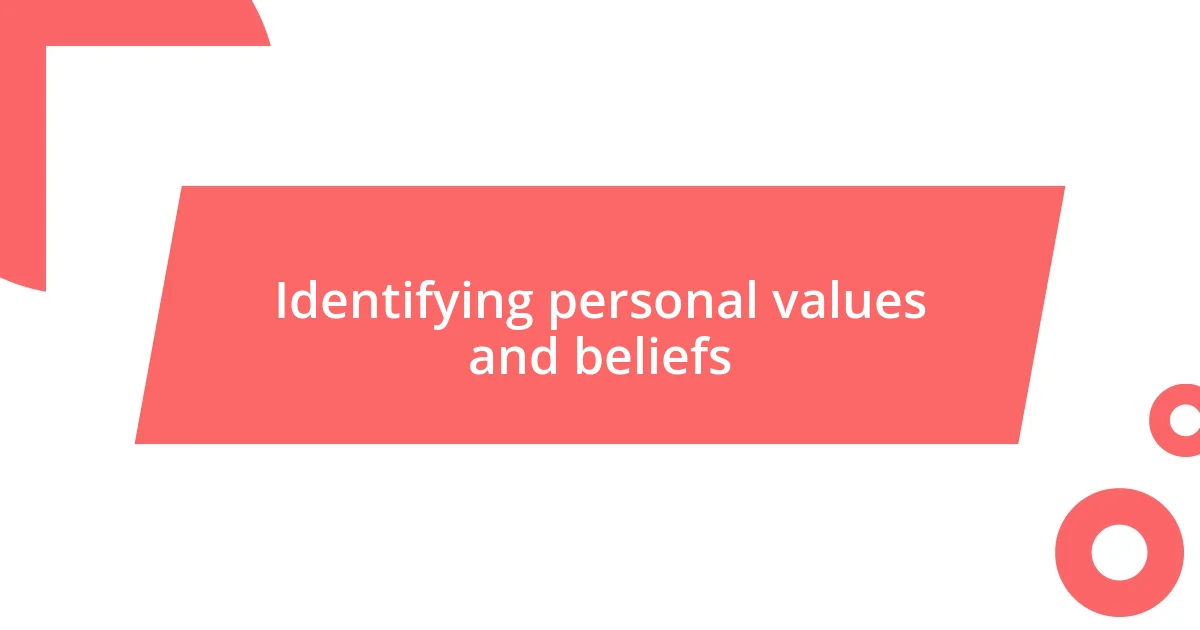
Identifying personal values and beliefs
Identifying our personal values and beliefs is an essential step in character building. I recall a time in college when I was part of a group project that spiraled into chaos. As discussions turned heated, I had to confront what mattered most to me: accountability and respect for others. By prioritizing these values, I found the courage to voice my concerns and guide the group towards a constructive resolution.
Here are some tips to help you identify your personal values and beliefs:
– Reflect on your past experiences and consider what feelings or outcomes resonated with you most.
– Write down moments when you felt proud or fulfilled and analyze what values were at play.
– Engage in conversations with friends or family to uncover shared values and gain insights into your own beliefs.
– Pay attention to what frustrates or angers you; often, these feelings stem from a clash with your core values.
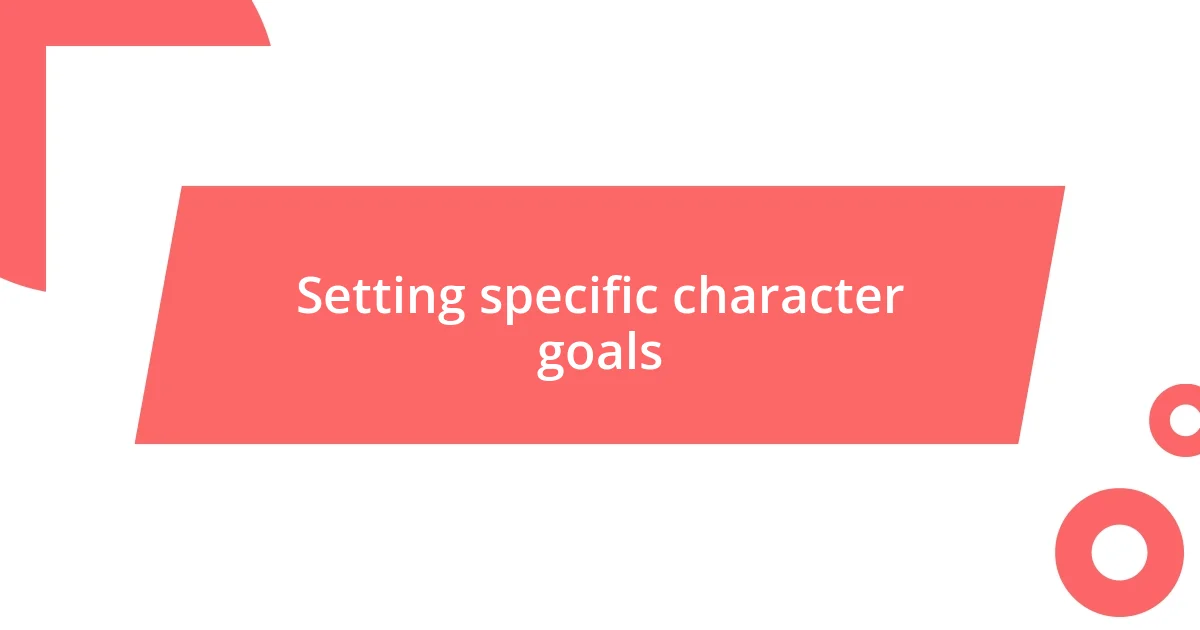
Setting specific character goals
Setting specific character goals is an empowering step in the journey of personal development. I remember crafting a goal around empathy after a realization during a volunteer event. I noticed how the small act of listening to someone’s story made a significant difference in their day. From that experience, I set a specific goal to actively engage in conversations that foster understanding and connection.
It’s important to make these goals tangible. For instance, instead of aiming to “be a better person,” I focused on a measurable goal: to practice active listening every week. I started jotting down insights from my conversations, noting how they influenced my interactions. This practice not only improved my relationships but also provided a clear path toward achieving my character goals.
Moreover, I’ve found that sharing these goals with friends creates accountability. When I enlisted a close friend to check in on my progress, it transformed my commitment into an enjoyable challenge. Have you ever tried this approach? The mutual support can enhance your journey, making character-building feel less daunting and more like a shared adventure.
| Goal Type | Specific Example |
|---|---|
| Empathy | Engage in one meaningful conversation each week. |
| Honesty | Practice openness by sharing my thoughts in group settings. |
| Kindness | Perform one act of kindness daily. |
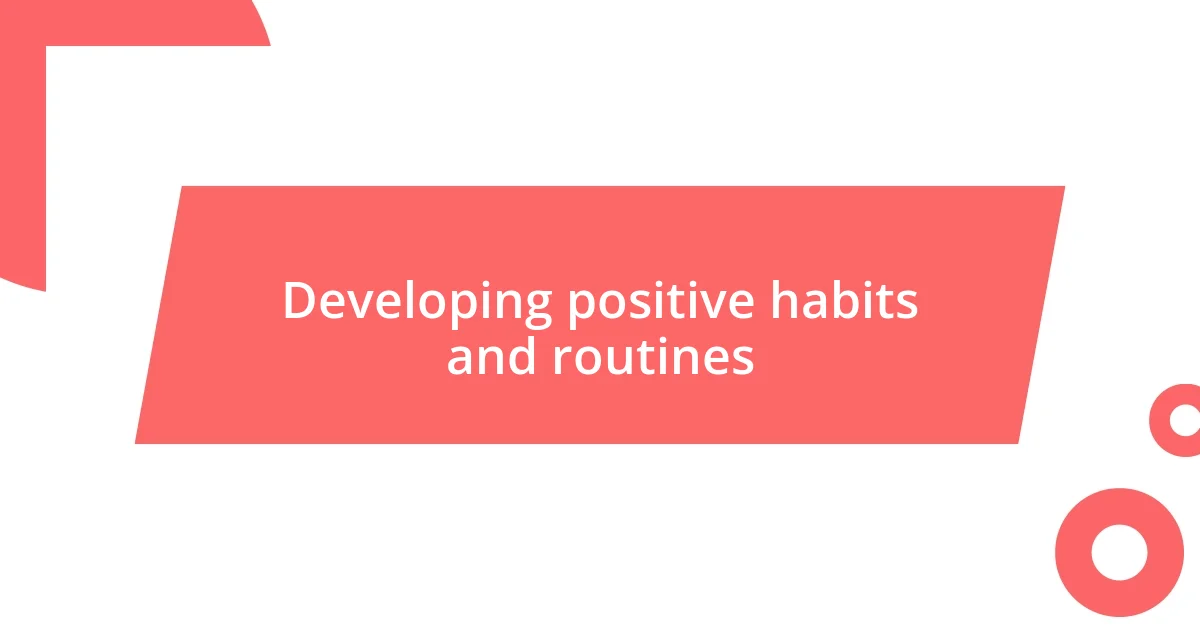
Developing positive habits and routines
Building positive habits and routines is where the magic of character development really happens. I remember when I decided to start my mornings with gratitude journaling. At first, it felt a bit forced, but over time, it transformed my mindset. I began to see the world through a lens of appreciation, which made challenges feel more manageable. Have you ever felt how small shifts in your routine can change your perspective?
Finding consistency in these habits can be challenging, but I found that tying them to existing routines helped significantly. For instance, I integrated reading into my nightly wind-down routine; after brushing my teeth, I’d read a chapter of a meaningful book. This simple addition not only brought me joy but also cultivated a habit of learning. The key is to make these moments enjoyable and relevant to your life.
Lastly, I’ve learned that celebrating small wins is essential. When I successfully maintained my gratitude practice for a month, I treated myself to my favorite coffee shop. That little reward reinforced my efforts and kept me motivated. What small victory can you celebrate today in your character-building journey?
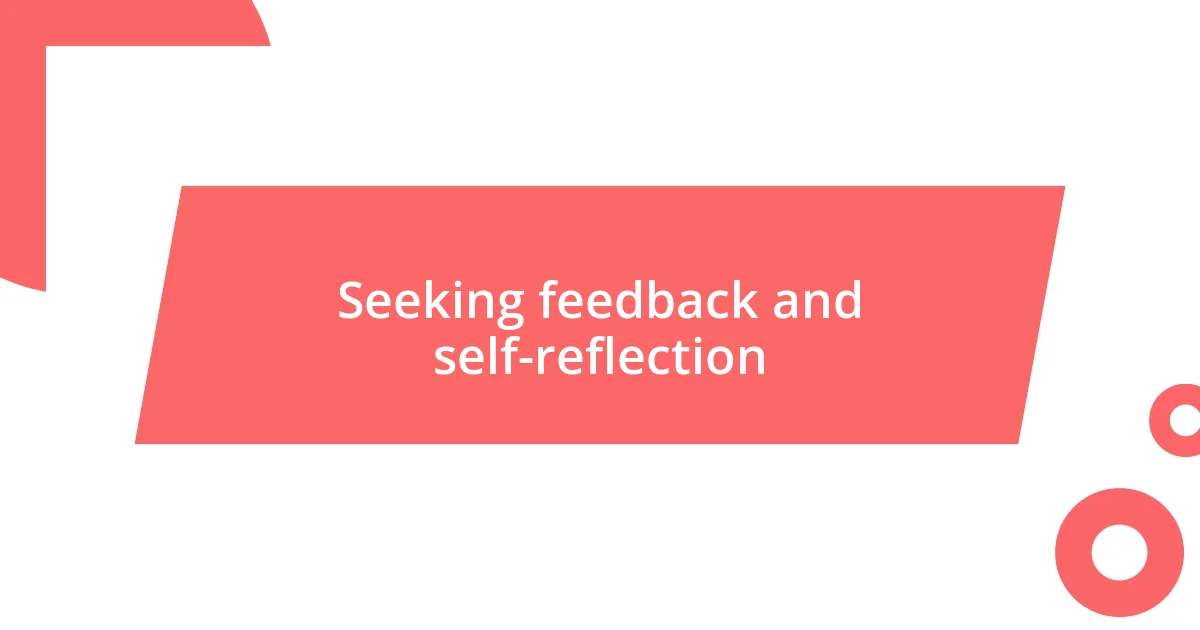
Seeking feedback and self-reflection
Seeking feedback has been a transformative aspect of my character-building journey. I vividly recall a moment when I asked a colleague for insights on my communication style. Their feedback was eye-opening; it highlighted areas where I could show more clarity and warmth. Receiving this kind of honest critique can feel vulnerable, but I’ve come to appreciate it as a catalyst for growth. Have you ever sought feedback and found it challenging to hear?
Self-reflection plays a pivotal role in deepening my understanding of myself. I often set aside time at the end of each week to journal about my experiences and interactions. It’s during these quiet moments that I uncover patterns in my behavior, sometimes realizing I’ve reacted defensively in discussions. When I confront these realizations, I can adjust my responses the next time. Reflecting like this allows me to approach situations with greater awareness and intention.
I’ve discovered a blend of feedback and self-reflection creates a powerful loop of improvement. One evening, I noted in my journal that my friend mentioned I tend to interrupt when I’m excited. The next day, I focused on practicing patience in our conversation. The joy of noticing my progress reinforced my commitment to deepen my relationships. What insights have you uncovered from your reflections that prompted change in your behavior?
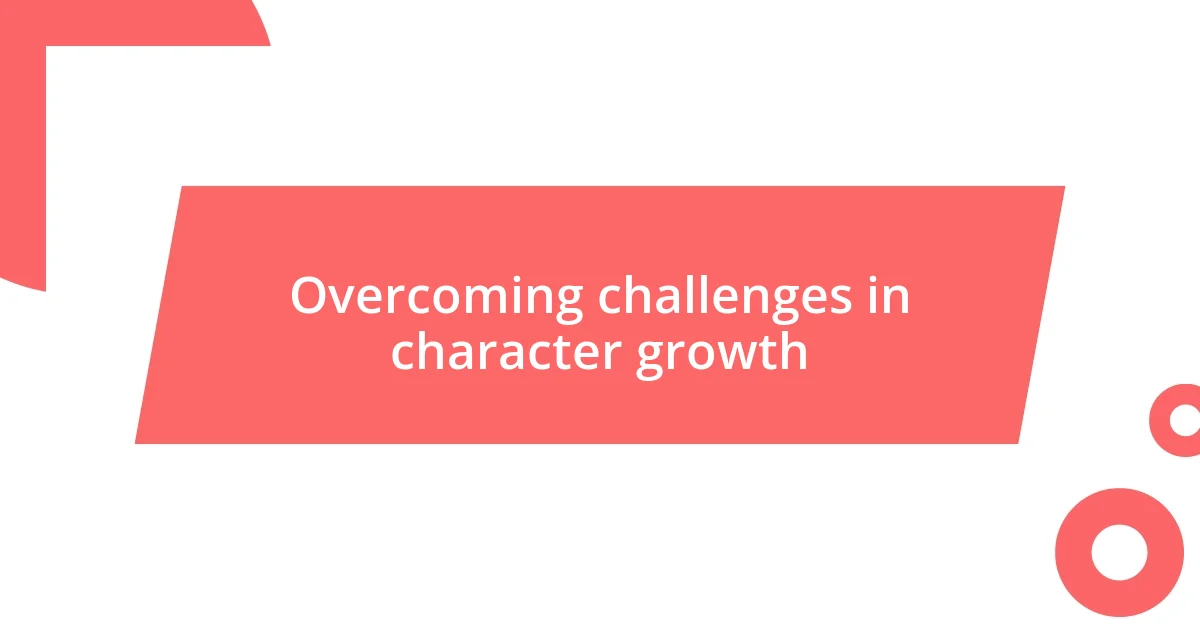
Overcoming challenges in character growth
Overcoming challenges in character growth often means confronting uncomfortable truths about ourselves. I remember a time when I struggled with patience, particularly during stressful situations. When my younger brother criticized my approach to a problem, my initial reaction was defensive, but I took a step back. Why does it feel so hard to accept criticism? I realized that embracing discomfort is crucial; it’s a sign that I’m on the right path to growth.
The journey is rarely linear. I’ve faced setbacks that left me questioning my progress, like the time I tried to be more empathetic but unintentionally hurt a friend’s feelings. It felt discouraging, and I asked myself, am I really making any progress? However, each challenge revealed an opportunity for learning. Reflecting on my missteps helped me develop a more genuine sense of empathy, confirming that growth is about understanding and evolving rather than achieving perfection.
Sometimes, motivation wanes, and I struggle to keep pushing forward. I recall a particularly tough week when I neglected my personal development goals. I felt lost, like I had taken two steps backward instead of moving forward. However, I found that reminding myself of my purpose, the deeper reasons behind my character-building efforts, reignited my drive. How about you? What motivates you to continue when the going gets tough?
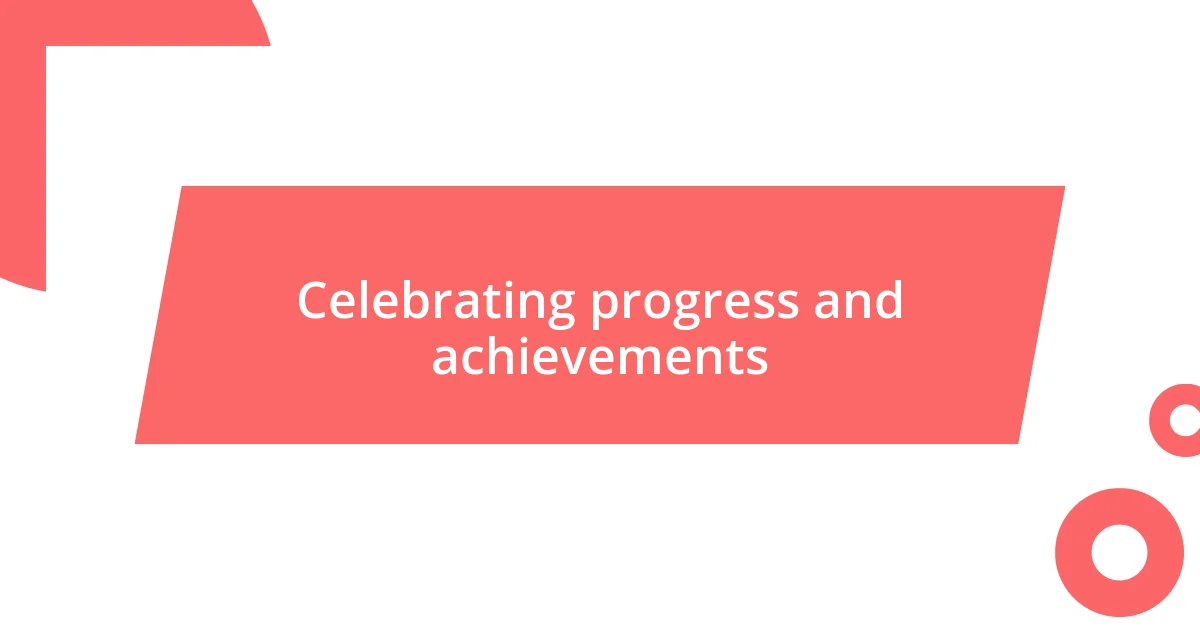
Celebrating progress and achievements
Celebrating progress and achievements is essential on this journey of character building. I have a habit of marking milestones, no matter how small. One time, I completed a challenging public speaking course, and instead of just moving on to the next goal, I threw a little gathering with friends to acknowledge this accomplishment. It was such a joyous moment, realizing I pushed through my fears and stepped outside my comfort zone. Isn’t it amazing how recognizing our achievements can reinforce our commitment to personal growth?
Reflecting on my daily or weekly wins allows me to appreciate how far I’ve come. I try to keep a “success journal,” where I jot down not just the big wins but also the little victories, like making someone smile or successfully managing stress in a tough situation. One day, I was particularly proud of calmly resolving a conflict at work that had been brewing for some time. The satisfaction of that moment stuck with me for days. Do you keep track of your wins? It’s a powerful, uplifting practice that fosters a positive mindset.
Acknowledging progress also fuels my motivation to pursue further challenges. I remember a phase where I was working on my resilience and faced numerous disappointments. After a few tough setbacks, I took a moment to celebrate my ability to bounce back, and that simple acknowledgment reignited my passion. It’s this cycle of recognition and motivation that pushes me to aim higher. Have you found that celebrating your progress energizes you for what lies ahead?










